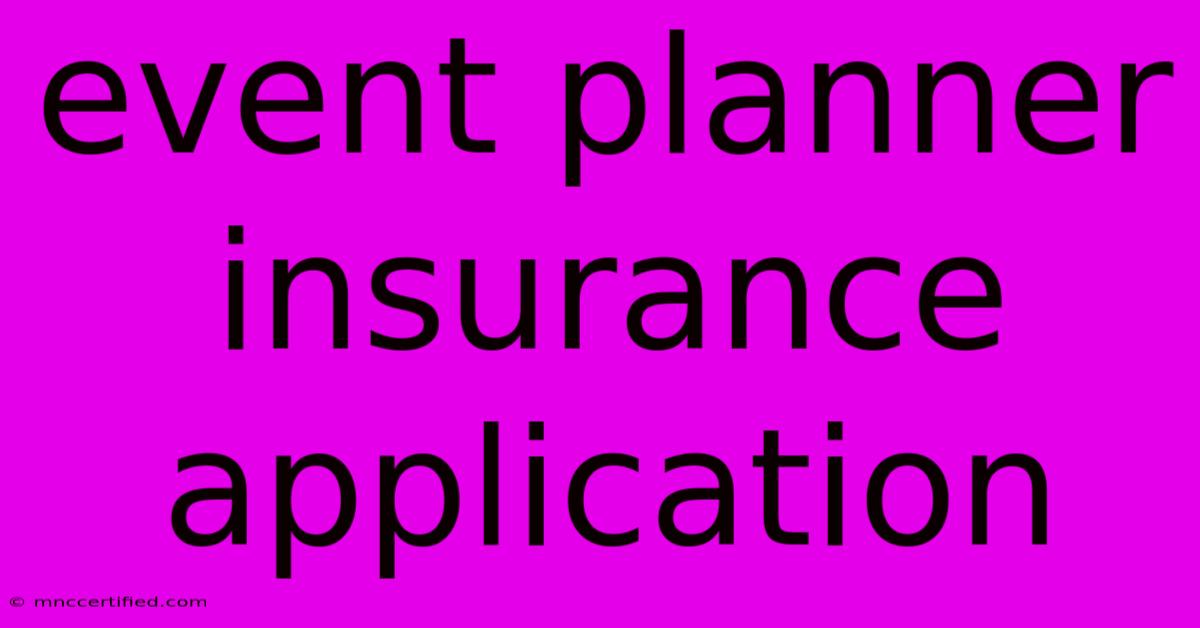Event Planner Insurance Application

Table of Contents
Navigating the Event Planning World: Understanding Event Planner Insurance Applications
Planning events is a creative and rewarding career, but it also comes with its share of risks. From potential injuries at a wedding to damage to rented equipment, event planners face a wide range of liabilities. This is where event planner insurance steps in, providing a safety net for you and your business.
But navigating the world of insurance applications can be daunting. This article will demystify the process, explaining the different types of coverage, key considerations, and how to find the right policy for your needs.
Why Do Event Planners Need Insurance?
Event planning is a high-risk profession. You're constantly working with large groups of people, managing complex logistics, and dealing with valuable equipment. Even the smallest mistake can lead to significant financial losses, legal issues, and damage to your reputation.
Here are some common scenarios where event planner insurance can protect you:
- A guest trips and falls at a wedding, injuring themselves. Your insurance would cover their medical expenses and any potential legal claims.
- A catering truck crashes, damaging equipment and food for an event. Your insurance could cover the cost of repairs, replacements, and lost profits.
- A client sues you for breach of contract. Your insurance would help cover legal fees and any financial damages.
Types of Insurance for Event Planners
There are several key types of insurance policies relevant to event planners:
1. General Liability Insurance:
This is a foundational policy that protects you against third-party claims of bodily injury, property damage, or personal injury. This covers scenarios like a guest slipping on a wet floor or someone getting injured by a malfunctioning piece of equipment.
2. Professional Liability Insurance (E&O):
This policy covers errors and omissions in your professional services. It safeguards you against claims arising from negligent acts, contract breaches, or failure to provide the agreed-upon services. For example, if a client claims you missed a crucial detail in their event planning, causing them financial losses, E&O insurance would help cover the costs.
3. Workers' Compensation Insurance:
If you employ staff, workers' compensation insurance is crucial. This policy protects your employees in the case of work-related injuries or illnesses. It covers medical expenses, lost wages, and rehabilitation costs.
4. Event Cancellation Insurance:
This policy reimburses you for financial losses if an event is canceled due to unforeseen circumstances like weather, natural disasters, or pandemics.
5. Equipment Insurance:
If you own or rent expensive equipment for your events, equipment insurance provides protection against damage or theft.
Essential Considerations When Applying for Event Planner Insurance
1. Understand Your Needs:
Start by carefully evaluating your business activities and the potential risks involved. Determine the type of events you plan, your average budget per event, and the number of employees (if applicable). This will help you identify the necessary coverage levels.
2. Choose the Right Provider:
Research different insurance providers specializing in event planning insurance. Compare quotes, coverage options, and customer reviews to find the best fit for your needs and budget.
3. Provide Accurate Information:
Be honest and thorough when completing the application form. This includes disclosing your business details, event history, and any potential risks.
4. Review the Policy Carefully:
Don't rush through the policy documents. Read them carefully to understand the terms and conditions, coverage limits, exclusions, and any potential deductibles.
5. Maintain Accurate Records:
Keep detailed records of your events, contracts, and financial transactions. This will be helpful for insurance claims in case of any disputes.
Finding the Right Event Planner Insurance
1. Online Insurance Marketplaces:
Websites like Insureon, CoverWallet, and Embroker offer a wide range of insurance options and allow you to compare quotes from multiple providers.
2. Insurance Brokers:
Independent insurance brokers have expertise in the event planning industry and can help you find the most suitable policy.
3. Professional Associations:
Many professional event planning associations offer insurance plans specifically tailored to their members.
4. Recommendations:
Ask other event planners for recommendations on trusted insurance providers.
Conclusion: Safeguarding Your Business with Event Planner Insurance
Event planner insurance is an essential investment in protecting your business and your financial well-being. By understanding the different types of coverage, conducting thorough research, and choosing the right policy, you can minimize your risks and focus on what you do best - creating unforgettable events!

Thank you for visiting our website wich cover about Event Planner Insurance Application. We hope the information provided has been useful to you. Feel free to contact us if you have any questions or need further assistance. See you next time and dont miss to bookmark.
Featured Posts
-
Good Investments In The Philippines
Nov 14, 2024
-
Investing In Multifamily Apartments
Nov 14, 2024
-
Ferrous Processing And Trading Toledo
Nov 14, 2024
-
Insurance Frauds Punishment Florida
Nov 14, 2024
-
Investment Management Solutions Llc
Nov 14, 2024